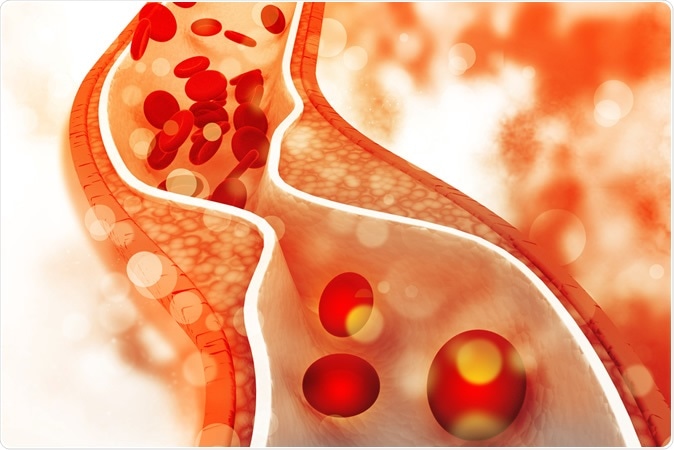Cardiovascular disease, including heart disease and stroke, are among the top killers worldwide. Ischemic heart disease and stroke are the world’s major killers, accounting for 15.2 million deaths in 2016. A high triglyceride level, combined with high low-density lipoprotein (LDL) cholesterol, is linked to atherosclerosis, which increases the risk for heart attack and stroke.

Cholesterol plaque in artery. Hywards / Shutterstock
Now, the National Health Service (NHS) in the UK, partners with Novartis, a Swiss multinational pharmaceutical company, to pursue an innovative new collaboration aimed at combatting the cardiovascular disease. The partnership revolves around trialing inclisiran, an unapproved cholesterol-lowering drug in the form of an injection administered twice-a-year. The NHS sees that the partnership will save thousands of lives, and cut medical bills for thousands of patients not taking statins.
Novartis is expected to request approval this year for the drug as a complementary treatment for those who have heart disease and are taking statins but are not responding to the treatment. Further, the drug can be taken by people in the place of statins.
“This deal is a strong vote of confidence in our world-leading life sciences sector that enables all high-risk ASCVD NHS patients to benefit from this potentially game-changing treatment. I am committed to helping the NHS reach its full potential, and innovative collaborations such as this put patients at the forefront of the most promising medical breakthroughs,” Matt Hancock, UK Health Secretary, said.
Promising results
Previous research found that an inclisiran lowered cholesterol levels by about 50 percent in patients who are also taking the maximum dose of statin. Subsequently, the researchers also found an associated decrease in heart attack and stroke in those taking the drug.
The drug is now in its Phase III development for secondary prevention patients with expected European Medicines Agency (EMA) regulatory filing the first quarter of 2020. The proposal for the drug to be administered in large scale NHS clinical trial, which is the first in the world to treat that patient population. The NHS will also evaluate and assess the approach to reduce the risk of heart disease.
The treatment, which is like a vaccine, will be first trialed on 40,000 middle-aged men and women whose cholesterol levels remained high even if they consume their daily dose of statins. However, starting from next year, the drug will be tested on around 300,000 patients a year. Estimates suggest that the drug can help prevent about 55,000 heart attacks and strokes in a decade, which can save 30,000 lives.
“This innovative and groundbreaking collaboration could transform the health outlook of tens of thousands of people suffering from heart disease, by bringing together in a unique combination our ability to organize large scale clinical trials, to address highly complex manufacturing issues, and to reach a large population of patients,” Lord Prior, chair of NHS England, said.
“It is a great illustration of how the UK Life Sciences Strategy can help both NHS patients and the wider economy and shows that the UK can be the center of a dynamic life sciences ecosystem whilst delivering great care,” he added.
Atherosclerosis and cardiovascular disease risk
High triglycerides and cholesterol levels may lead to atherosclerosis, a condition that involves the hardening of the arteries. It can reduce the blood flow and when it blocks the arteries, it can lead to serious and potentially fatal conditions such as heart attack and stroke.
In atherosclerosis, plaque, which is made of cholesterol, fat, calcium and other substances in the blood, accumulate inside the arteries. In the long run, the plaque hardens and narrows the arteries, limiting blood flow with oxygen and nutrients to vital organs and other parts of the body.
Source:
Department of Health and Social Care, NHS England, Office for Life Sciences, and Department for International Trade. (2020). UK Government tackles heart disease with new partnership. https://www.gov.uk/government/news/uk-government-tackles-heart-disease-with-new-partnership